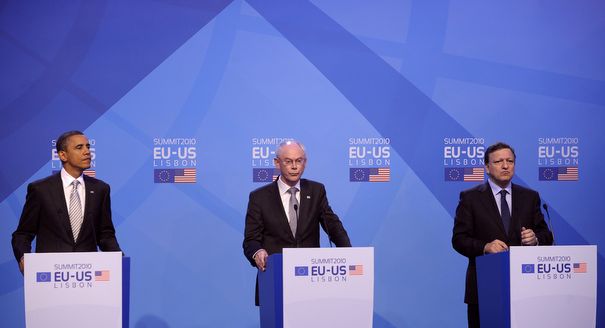It should be obvious: the better the United States and Europe cooperate and coordinate their global policies, the greater the chance of keeping the liberal world order alive and kicking. The West, will need to remain strong if rising powers—above all China—are to be brought into the framework which was built after the Second World War, and which became universal after the end of the Cold War; a world system based on liberal democracy and the market economy—and an American guarantee to keep order, and to police large parts of the world.
Europe and America still have more in common with each other than with any other potential partner and both are losing relative weight in the world. It is therefore necessary to re-invent the Western alliance that was built during the Cold War, and which still relies overwhelmingly on institutions that reflect this era. But times are changing. The main purpose of the alliance was to defend the West against the Soviet Empire. Now the main strategic purpose of the transatlantic partnership is cooperation on global politics. But to achieve this, Europe and America cannot rely solely, or even primarily, on a military alliance. What is needed are institutional platforms.
Such a platform already exists, but it is not serving this purpose. Once a year the U.S. President, along with his foreign and defense ministers, meets with the Presidents of the European Council—Van Rompuy—and of the EU Commission—Barroso—and the EU’s foreign policy chief—Ashton. These meetings are considered, at least on the American side, to be a waste of time. They appear to serve mainly as a venue for the Brussels players to beef up their reputation by meeting the most powerful man in the world.
The current format of EU-U.S. summits is more than a waste of time, it is a political and strategic danger. It creates the impression that there is no real need for a high-level exchange between the United States and Europe besides the occasional tête-à-tête on the sidelines of major international meetings or conference calls between Obama and European leaders. But the truth is that for both sides there is no higher strategic priority than to sit down and discuss global strategies —from the reset with Russia to free trade deals, from keeping the peace in the South China Sea to fighting al-Qaida in the Sahel. Cooperation and coordination on these and other issues is vital for both sides, but it only happens at random.
The EU-U.S. summits should be the natural place for this exchange. They should be expanded, and revamped. Both sides should meet twice a year, and foreign and defense ministers should even meet four times a year—EU foreign ministers meet every month. But in order to be effective, and efficient, European participation must change. It is impossible to have such a meeting without having the German chancellor, the French President, and the British Prime Minister at the table. The EU 3 are essential for any transatlantic meeting with a strategic purpose, and they cannot by represented by Brussels figures. In addition, the “second league” needs to be included—Italy, Spain and Poland. All other 21 EU member states could rotate for 2 or 3 seats at the table.
Such a revamped EU-U.S. summit could become the center of gravity for a new transatlantic partnership—built not on sentimental memories of the Cold War, but on the practical needs of the twenty-first century. But to get there would require a cultural and political revolution on the European side. The European Union would have to admit that the way it currently presents itself to the world is simply not working. When essential things need to be discussed and decided, Barroso, Van Rompuy, and Ashton cannot speak for the big member states—because individual member states ultimately decide over resources and strategies, and it looks as if this won’t change.
The EU is built on the idea that power is being replaced by law. But the more the EU evolves into a global actor, the more it must acknowledge that the world is still a place run by power, and powers. It must acknowledge that the EU itself is only efficient and effective as a global actor to the extent it manages to integrate the European powers—the nation states—therefore becoming the sum of all parts, or even more.
To admit that power matters means also to admit that there are differences in power among the nation states—that not everybody is equal. If an EU-U.S. meeting is meant to be efficient, not all 27 heads of state or government can have a seat at the transatlantic table.
That makes it a non-starter in Brussels—the formal equality of the member states is a sacred cow. But if the EU is serious in its ambition to become a foreign policy actor, it must back the existing Brussels structures with real power, the kind of power that only the key member states dispose of. If this problem is not addressed, the EU will remain on the margins of global politics. There’s a choice to be made.
Ulrich Speck is a foreign policy analyst in Heidelberg, Germany. He is an associate fellow at Spanish think tank FRIDE, senior analyst at Wikistrat, and editor of the Global Europe Morning Brief.






